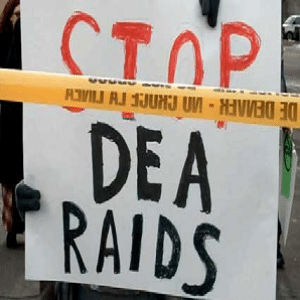 The marijuana legalization movement danced a victory dance last night at the announcement by the US Department of Justice of eight new priorities to guide US Attorneys in the prosecution of state-regulated marijuana markets. Specifically, DoJ announced it would not be suing to enjoin the ballot initiatives passed by Washington and Colorado, that state regulated markets abiding by the eight priorities would be “less likely” to attract federal prosecution, and that well-run state programs “may affirmatively address those priorities.”
The marijuana legalization movement danced a victory dance last night at the announcement by the US Department of Justice of eight new priorities to guide US Attorneys in the prosecution of state-regulated marijuana markets. Specifically, DoJ announced it would not be suing to enjoin the ballot initiatives passed by Washington and Colorado, that state regulated markets abiding by the eight priorities would be “less likely” to attract federal prosecution, and that well-run state programs “may affirmatively address those priorities.”
In Colorado, with its “seed-to-sale”, highly-regulated program of both medical and recreational marijuana, marijuana dispensaries are breathing a sigh of relief. But in the state of Washington, the responses from the US Attorneys, Jenny Durkhan and Micheal Ormsby, whose districts includes Seattle and Spokane, respectively, should send a shiver down the spines of medical marijuana distributors.
We will continue to enforce the Controlled Substances Act. … We will continue our work against organized criminal organizations and their underground economy… The continued operation and proliferation of unregulated, for-profit entities outside of the state’s regulatory and licensing scheme is not tenable and violates both state and federal law. While our resources are limited, we will continue to enforce federal law in this arena…
Washington State has no regulatory and licensing scheme for medical marijuana. Washington even lacks the state registry card system found in almost all other medical marijuana states. The collection of dispensaries, co-ops, and farmers’ markets that have proliferated in the Puget Sound area and the Palouse operate on a wink and a nudge since 2011 when then-Gov. Christine Gregoire line-item-vetoed the portions of Senate Bill 5073 that established a regulated dispensary system. Gregoire’s fear at the time was that the involvement of state officials in regulating dispensaries would subject them to potential federal prosecution. Ironically, that lack of state regulation now puts these businesses in greater danger than had Gregoire signed the regulations.
This frightful news for medical marijuana distributors follows previous concerns about the taxation scheme for Washington’s recreational marijuana market, which will tax pot 25% three times – at the cultivation, wholesale, and retail level – plus the standard state sales tax of 6.5%. There is no taxation on the state’s current medical marijuana market, though some dispensaries seeking legitimacy have voluntarily paid some taxes. State marijuana consultant Mark Kleiman, dubbed Washington’s Pot Czar, has suggested that medical marijuana will have to be equally taxed in order for the recreational market to take hold, or else far cheaper medical pot will become a strong incentive for recreational users to game the system for a medical recommendation.
Some state lawmakers paint an even bleaker picture. Rep. Chris Hurst, speaking to Huffington Post, predicted last May that medical marijuana dispensaries will not survive once recreational pot shops open, anticipating that the federal government will crack down on the unlicensed, unregulated entities. ”All you have to do is make examples of five or six people and the entire industry collapses almost immediately,” Hurst said. “You have to have something to replace it, and that’s what the recreational market is.”
If the recreational market is the replacement for medical users, they can expect to be spending $12 or more per gram retail, according to estimates from the State Liquor Control Board (which controls the marijuana market). Current prices range from $5 to $10 per gram for those patients patronizing the medical marijuana dispensaries and farmers’ markets. Patients would also be limited to purchases of an ounce or less to comport with the recreational laws. Medical users would still retain the rights to possess 24 ounces of marijuana and to cultivate 15 plants or collectively cultivate 45 plants, however, so some incentive to “get medical” will still exist for recreational users, especially since Washingtonians, unlike Coloradoans, do not have any right to grow plants for personal use.
Source: National Cannabis Coalition – make a donation







